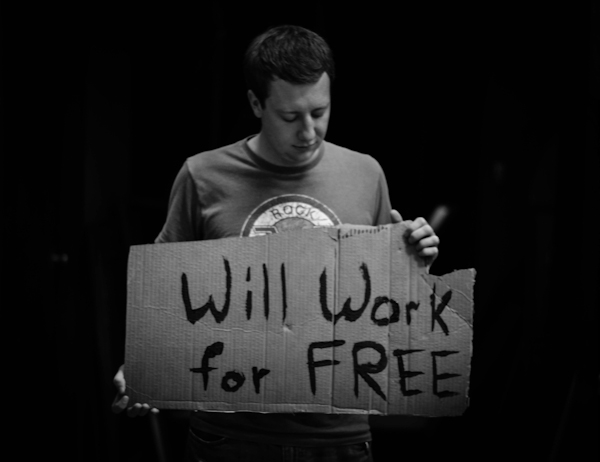Photo by: Will Gentry
Throughout the years, unpaid internships have become a right of passage for most college students, but members of the Fair Pay Campaign are urging students to leave these internships behind.
When he couldn’t get a paying job after completing an unpaid internship, 23-year-old Mikey Franklin started the Fair Pay Campaign in 2012. Franklin did receive college credit for his internship but said, “I can’t pay rent with college credit.”
The Fair Pay Campaign is on a mission to end the use of unpaid interns by for-profit organizations.
Despite most internships being unpaid, students are usually able to exchange these experiences for college credit.
“I think getting college credit as a form of payment is fair,” senior Madison Huntsman, who is currently holding and unpaid internship with Lilyfield Adoption Agency, said. “I’m doing my internship as a practicum credit so I do feel as though I am getting something back in return.”
Franklin and his campaign plan to start their cause with the White House, a large employer of unpaid interns, but in the meantime strongly urge colleges and universities to stop pushing students towards unpaid internships.
“I don’t agree with getting rid of unpaid internships,” Huntsman said. “I think that whether you get paid or not, interning is a great experience. By working alongside the employees, internships are a great educational opportunity.”
Other students voiced concerns about the trade-off for more paid internships.
“I think it would be great if more paid internships were available to college students, but if that means less opportunities then I don’t support it,” junior Joelle McMillen, who held an unpaid internship at North Church, said. “Having only paid internships would be nice for the interns that can get them.”
While the Fair Pay Campaign is moving forward with their mission, some students have begun to question the future of college internships if the campaign’s demands are met.
“Internships are already hard enough to come by and there are obviously more unpaid than paid internships,” junior Jamal George, who had a paid internship at Capitol Hill Church of Christ, said. “Getting rid of these unpaid internships can be really bad for some students because the amount of opportunities they may have had could dramatically decrease if employers are forced to pay interns.”
Huntsman agreed.
“If a company or organization wants to pay their interns and can afford to do so, that’s great, but I don’t think they should be forced to pay interns,” Huntsman said. “A lot of great opportunities could be lost if companies were forced to pay interns because they obviously wouldn’t be giving out as many. If forced to pay someone, most companies would rather hire a new employee who already has the necessary experience.”
It’s the experience from internships, paid or not, that a lot of employers look for in potential employees. Because of this, many students are familiar with the usual paradoxical dilemma: it’s difficult to get a job without experience, but it’s difficult to get experience without a job. For a lot of those students, internships have served as a practical solution.
“If there’s an unpaid internship that correlates with your field of study, I think it’s a good idea to take advantage of that experience and use it to your benefit,” McMillen said. “Whether you’re getting paid or not doesn’t change the fact that you’re getting valuable job experience.”
The Fair Pay Campaign is not calling for every unpaid internship to be cut. Franklin focuses on internships that match the work of a paid employee. The federal Fair Labor Standards Act sets out a six-part test to determine whether an internship can be unpaid. The internship must be similar to “training which would be given in an educational environment,” run primarily for the intern’s benefit and involve work that doesn’t replace that of paid employees.
“Whether an internship is paid or unpaid, I feel as though you get the same effect from the experience,” George said. “At the end of the day, whether or not you get a paycheck doesn’t change the fact that you’ve gained new experiences and can use that to put on your résumé and better market yourself to future employers.”
Although the Fair Pay Campaign’s goals haven’t been achieved yet, interns are coming a long way and receiving more rights in the workplace. In May, Oregon voted to extend workplace civil rights to interns, regardless of pay status.
“I think unpaid interns should get the same basic rights as a regular employee,” George said. “I think that if something were to happen, there should be steps in place for an unpaid intern to take because anything can happen. If you’re not going to pay your intern, you should at least take care of them.”
Though the Fair Pay Campaign hasn’t made any legal impacts, it has gained a number of supporters. College campuses across the country have begun petitions and have started trying to offer more paid internship opportunities for their students. If the Fair Pay Campaign is legally recognized, college students could be seeing the end of unpaid internships.













Be First to Comment